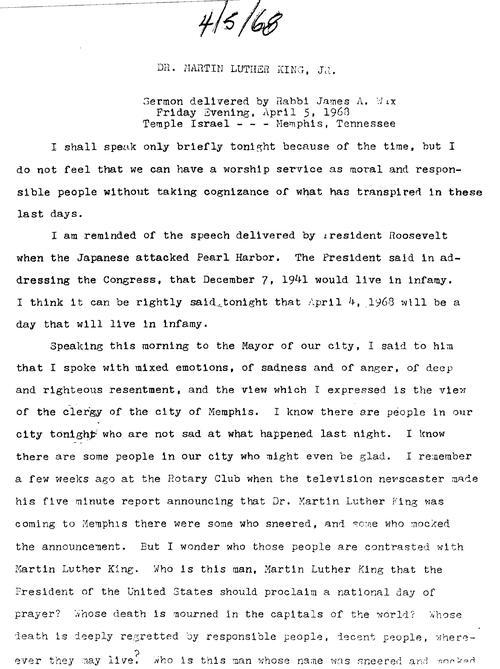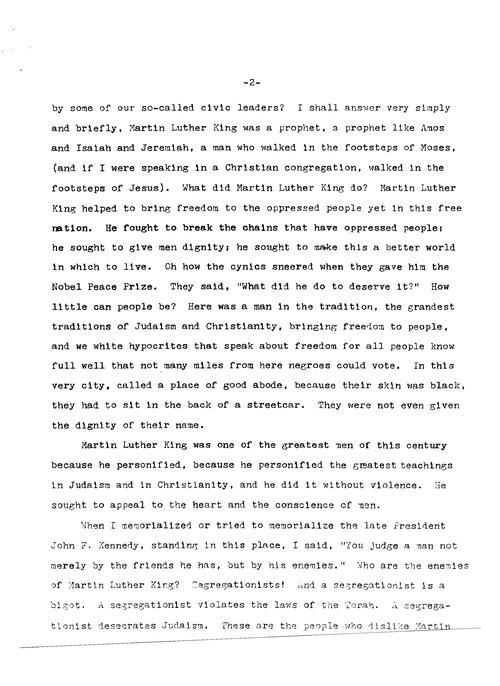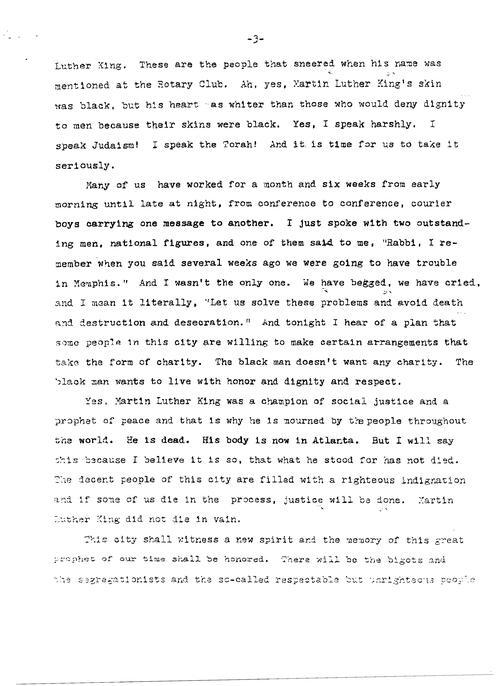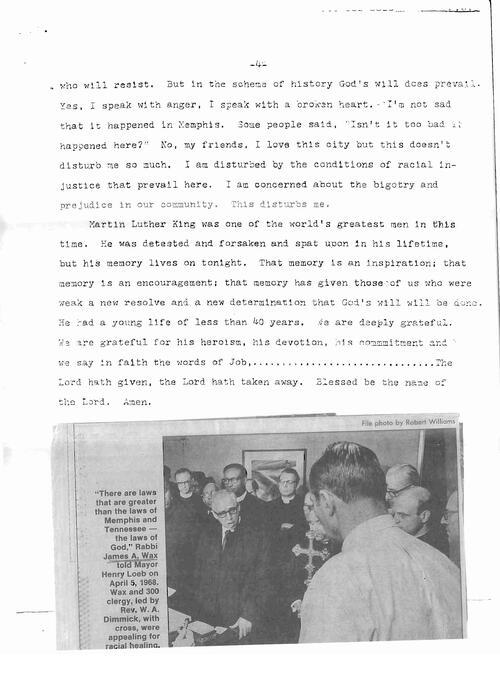Sermon by Rabbi James Wax
James Wax
Ordained at Hebrew Union College-Jewish Institute of Religion in the 1930s, James Wax served as the rabbi of Temple Israel in Memphis, TN, in the 1960s. Rabbi Wax supported racial justice, and during this period was a member of the Memphis Committee on Community Relations which worked towards integration. He also played an important role in resolving the sanitation workers' strike, which dragged on for many months, beginning in February 1968. Rabbi Wax knew Memphis Mayor Henry Loeb, who had at one time been a member of his congregation, and spoke to Loeb alone and with other delegates on several occasions to negotiate an end to the strike. After Martin Luther King, Jr. was assassinated while in Memphis supporting the sanitation workers' strike, Wax helped to arrange for the secret payment to the state of the funds necessary to pay the salary increases for the sanitation workers. Just days after King's assassination, Rabbi Wax shared his views of King with his congregation in a sermon.
Rabbi Wax Sermon on Martin Luther King, Jr., April 5, 1968
Rabbi James Wax's Sermon on Dr. Martin Luther King Jr., 1968, Page 1
Page 1 of 4: Rabbi James Wax, "Dr. Martin Luther King, Jr." Sermon delivered at Temple Israel, Memphis, TN on April 5, 1968. Courtesy of Rabbi James Wax, Board of Trustees, and Archivist of Temple Israel, Memphis TN.
Rabbi James Wax's Sermon on Dr. Martin Luther King Jr., 1968, Page 2
Page 2 of 4: Rabbi James Wax, "Dr. Martin Luther King, Jr." Sermon delivered at Temple Israel, Memphis, TN on April 5, 1968. Courtesy of Rabbi James Wax, Board of Trustees, and Archivist of Temple Israel, Memphis TN.
Rabbi James Wax's Sermon on Dr. Martin Luther King Jr., 1968, Page 3
Page 3 of 4: Rabbi James Wax, "Dr. Martin Luther King, Jr." Sermon delivered at Temple Israel, Memphis, TN on April 5, 1968. Courtesy of Rabbi James Wax, Board of Trustees, and Archivist of Temple Israel, Memphis TN.
Rabbi James Wax's Sermon on Dr. Martin Luther King Jr., 1968, with Newspaper Clipping, Page 4
Page 4 of 4: Rabbi James Wax, "Dr. Martin Luther King, Jr." Sermon delivered at Temple Israel, Memphis, TN on April 5, 1968. Courtesy of Rabbi James Wax, Board of Trustees, and Archivist of Temple Israel, Memphis TN. The newspaper clipping shows a photo of Wax.
Discussion Questions
Part I
- Initial assessment: Who delivered this sermon? When?
- How was it communicated? Where was it communicated? How do you think this might have influenced the message?
- Who was the intended audience? How do you think that might have influenced the message?
- How does Rabbi Wax view Martin Luther King, Jr.? What in his sermon makes you say that?
- How are these views similar and/or different from those of other people Wax mentions in his sermon?
- What, according to Rabbi Wax, is God's will?
- What do you think Rabbi Wax's purpose is in giving this sermon?
- Why do you think it might have been harder for Rabbi Wax to give this sermon in Memphis than it would have been for a Northern rabbi to give this sermon?
Part II
- How do you think James Wax's experience and/or Jewish values influence his participation in the Civil Rights Movement? What makes you say that?
- How would you describe the role that Rabbi Wax played in the Civil Rights Movement?
- Do you think this is an appropriate role for a rabbi? Why or why not?
- Are there any current political/social issues on which you think rabbis today should take a stand? What kind of role would you want to see them take?






